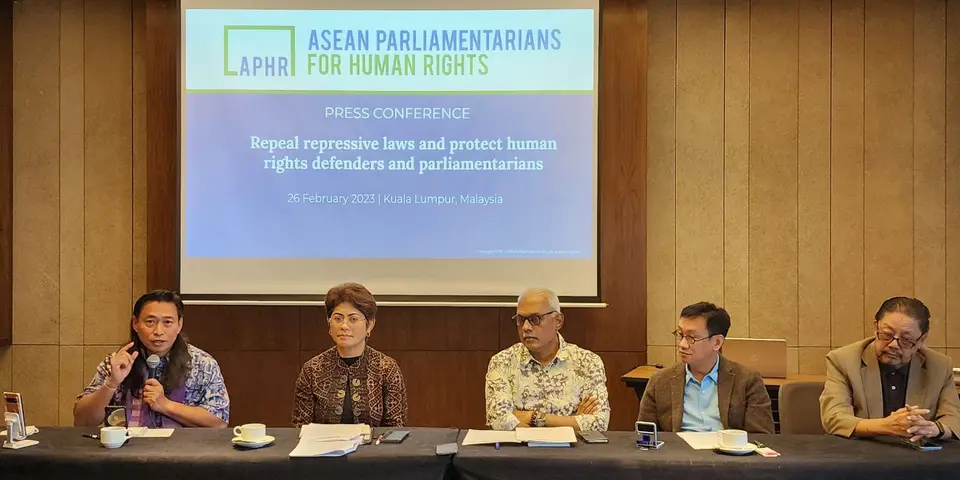
Southeast Asian MPs call Malaysian government to repeal repressive laws, protect parliamentarians and human rights defenders
February 26, 2023

KUALA LUMPUR – Lawmakers from across Southeast Asia urged the new Malaysian government to show its commitment to human rights by repealing repressive laws that are too often used to criminalize government critics, including parliamentarians and human rights defenders.
“As a long time member of the opposition, we hope that Prime Minister Anwar Ibrahim recognizes the dangers posed by overly broad and ambiguous legislation that can easily be used by those in power to target opposition politicians and human rights defenders,” ASEAN Parliamentarians for Human Rights (APHR) Chair and member of the Indonesian House of Representatives, Mercy Barends, said today at a press conference in Kuala Lumpur.
Two laws are of particular concern: the 1948 Sedition Act and the 1988 Communication and Multimedia Act. The Sedition Act can carry a punishment of three to seven years in prison for vaguely worded offenses, including acting with “seditious tendency” against the government. The former Barisan National government used the law to harass and imprison critics, including human rights defenders, academics, journalists and lawyers.
The Sedition Act has also frequently been used against opposition parliamentarians; in 2016, for example, People’s Justice Party MP and APHR member Tian Chua was sentenced to three months in prison and fined more than 400 USD after delivering a speech denouncing racism and corruption.
Meanwhile, section 233 of the Communication and Multimedia Act, which criminalizes online content that is “obscene, indecent, false, menacing or offensive in character”, is too vaguely worded and therefore prone to misuse.
“The new Malaysian government must live up its promises and prove its commitment to human rights by ensuring that parliamentary immunity and the right to freedom of expression for all parliamentarians are effectively upheld,” said Charles Santiago, APHR Co-Chair and former Malaysian member of parliament.
APHR Members from Indonesia and the Philippines visited Malaysia to extend their solidarity with its Co-Chair, Charles Santiago, who is facing a defamation lawsuit from influential and controversial preacher Zakir Naik.
“We express our concern over this case because, albeit it was a civil case filed by an individual, it shows one of the main risks lawmakers throughout Southeast Asia face when speaking on issues that are of public concern,” said Barends.
The targeting of opposition MPs and human rights defenders through the use of draconian laws is unfortunately not limited to Malaysia. In Myanmar, the parliament remains suspended since the military coup in February 2021 that ousted the NLD elected government. Members of the national and sub-national parliaments remain in detention, facing not only the risk of torture in prison but also possible risk of execution following the executions of four pro-democracy activists, including a former lawmaker. Most ousted parliamentarians continue their work in hiding and are at risk of detention or even death.
“Parliamentarians should be able to carry out their mandate as the people’s representatives without fear of reprisals if they say the wrong thing or offend the wrong person,” said APHR member and Malaysian member of parliament Wong Chen.
Meanwhile in the Philippines, disinformation and red-tagging campaigns against opposition parties and lawmakers continue, and it intensified ahead of the national elections, leading to widespread online threats and violence against lawmakers and their supporters.
“Lawmakers who have criticized the government have also faced trumped-up and politically-motivated charges, including APHR Board Member Walden Bello, who faces cyber-libel charges, and Senator Leila De Lima, who has been unjustly detained since 2017 on absurd drug charges. Governments and parliaments throughout Southeast Asia, including Malaysia, should learn from the Philippines, and work to repeal repressive laws to ensure that this kind of persecution against lawmakers do not occur,” said Teddy Baguilat, Jr., APHR Board Member and former Philippines member of parliament.
ASEAN Parliamentarians for Human Rights (APHR) was founded in June 2013 with the objective of promoting democracy and human rights across Southeast Asia. Our founding members include many of the region's most progressive Members of Parliament (MPs), with a proven track record of human rights advocacy work.